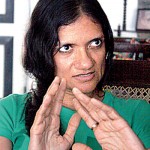It’s certainly no walk in the park
When a reviewer said, “nothing has been said-everything has been communicated”, Ruwanthie de Chickera knew that her vision for Walking Path was not in vain. That the play’s international audiences also immediately understood what was being presented- a social experiment in conditions that some would describe as uniquely Sri Lankan- further cemented this fact. ‘A play without words’, runs the tagline for Walking Path and that is exactly what it is.

A scene from the play
The hour-long play (1 hour, 10 minutes to be precise) which had its premiere in July this year, is her company Stages Theatre Group’s experiment with devised theatre, and that’s why when we say Ruwanthie, for all official purposes, scripted the play, what we mean is that she also had a hand in direction along with director Jayampathi Guruge. “There are no defined roles here,” she explains. “The actors also played a tremendous role in conceptualizing the production.”
This is not to say that Ruwanthie and Jayampathi haven’t had to make harsh calls on the play’s content and scenes. “It’s not for everyone,” she says of these decisions. “We’ve had actors in tears.” The danger with an evolving script was that it could assume a life of its own and both director and playwright felt that certain creative calls had to be made despite reservations from others. She feels that this has resulted in a tighter, more cohesive play.
Walking Path delivers exactly what it says on the title. Months before the play took to the stage, the director, playwright and their cast spent several days sitting in Colombo’s parks, observing those who observed others, and the ‘others’ themselves. “It’s like one big human zoo,” muses Ruwanthie. “You have the people who come to exercise in this extremely public space, then you have the people who sit and observe these people, and then you have the people outside the park who are watching all these people in the park! Then there was us, watching them all.” The decision to give no dialogue to the play stemmed in part from this silent observation. Not a word was said throughout these observations, “so it felt very natural to make it non-verbal,” says Ruwanthie.

Ruwanthie: The play is not for everyone
Not defining the play with a language also allows their audience to come up with their own interpretation of what they see on stage. For Ruwanthie, the play explores the rapid gentrification of Colombo and the public’s negotiation with this change, and the silent presence hovering over all these changes. The newly developed Walking Paths are a potent symbol of the country’s peace and freedom following a long conflict, yet it is also an oxymoron, she muses, for “it is freedom monitored by the military”. In the play different scenes tackle the sub cultures that have evolved amongst these Walking Paths. Technology plays a significant role in this evolution, especially in how community is perceived by the new generation.
In presenting a play without words they’ve had to rely on other techniques to get the message across, and music plays a major role in all this-Ruwanthie and her team works with Ranil Goonewardene and she says “he’s brilliant. He’s able to just listen to something and transfer that into music.”
At the end of the day, Ruwanthie feels that a play without words is the right way to move forward; “it feels like it has been born out of this time and age,” she says. “We have a society divided on various issues, and by not saying what we want to say verbally I think we’re bringing people together in a way.”
Walking Path will go on the boards at the Lionel Wendt on November 21 and 22 -two shows are scheduled for 3.30 p.m. and 7 p.m. on each day. Tickets are available at the Wendt.


